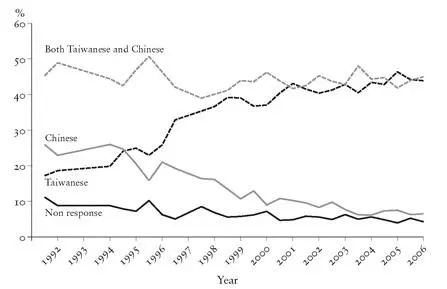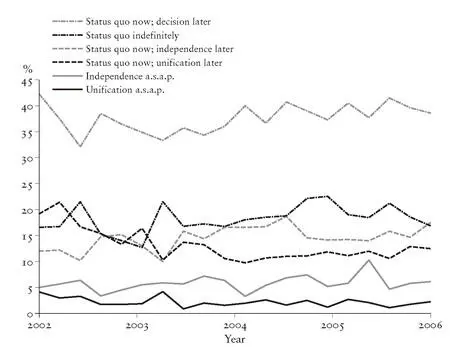China’s attitude towards Taiwan is fraught not only because it regards the island as one of its lost territories, and therefore as historically part of China; there is an extra charge because Taiwan became a bone of contention after the civil war between the Chinese Communist Party and the nationalist Kuomintang, with the flight of Chiang Kai-shek and his forces to the island and the declaration that it was now the Republic of China, claiming sovereignty over the whole of China. As a consequence, Taiwan represents unfinished business, the only incomplete item on the Party’s civil war agenda. This is why the return of Taiwan to Chinese sovereignty is the ultimate non-negotiable for the present regime and, given the strength of Chinese public opinion on the issue, probably for any other regime one could imagine as well. [968] [968] Zhu Feng, ‘Why Taiwan Really Matters to China ’, 30 November 2004, posted on www.irchina.org
The road since 1949 has been tortuous, from the pariah status bestowed upon China by the West and its recognition of Taiwan rather than the People’s Republic of China as the true China, to the American volte-face after the Nixon-Mao rapprochement, and then the steady international isolation of Taiwan over the last four decades. But China ’s ultimate objective, namely reunification, has proved beyond reach because the Taiwanese themselves have remained firmly opposed to it, with the tacit support of the Americans.
Indeed, China ’s hopes were to be thwarted by a most unexpected development, a growing sense of Taiwanese identity culminating in the electoral defeat of the Kuomintang (KMT), which, in principle at least, had always supported a one-China policy, and the victory of the pro-independence Democratic Progressive Party (DPP). After the election of the DPP’s Chen Shui-bian as president in 2000, Taiwan pursued a policy of desinicization and increasingly assertive nationalism. This happened to coincide with growing economic interdependence between China and Taiwan, which, though resisted for a period by Chen and his predecessor as president, Lee Teng-hui, [969] [969] Chu Yun-han, ‘The Political Economy of Taiwan’s Identity Crisis: Implications for Northeast Asia’, paper given at conference on ‘Nationalism and Globalisation in Northeast Asia ’, Asia Research Centre, London School of Economics, 12 May 2007.
has accelerated to the point where, by 2003, half of the top 1,000 Taiwanese firms, including all the major computer companies, had invested in the mainland, usually in manufacturing subsidiaries. Around three-quarters of Taiwanese foreign direct investment presently goes to China, and there are hundreds of thousands of Taiwanese living and working in the Shanghai region and Guangdong province. The Chinese market now accounts for around 40 per cent of Taiwanese exports, a huge increase on just a few years ago. [970] [970] Richard Bush, ‘Taiwan Faces China: Attraction and Repulsion’, in Shambaugh, Power Shift , p. 173; Chu Yun-han, ‘The Political Economy of Taiwan’s Identity Crisis’, p. 3.
Will growing economic interdependence mean that the two countries are drawn irresistibly closer together, resulting in some kind of political arrangement between them? Or will the sense of difference that clearly informs Taiwanese consciousness close off that option and lead to a growing desire for de jure, and not just de facto, independence?
A key question here concerns the nature of Taiwanese identity. To what extent is it constituted as different from and in opposition to Chinese identity? And is a sense of Taiwanese identity positively correlated with support for Taiwanese nationalism and ultimately independence? As can be seen from Figure 29, between 1992 and 2006 the proportion of Taiwanese who thought of themselves simply as Chinese has been steadily declining, while those who felt themselves to be Taiwanese has been commensurately rising. However, the group that consider themselves to be both Taiwanese and Chinese has been consistently large — by a narrow margin, in fact, the biggest of all — accounting for almost half the electorate. The picture is, therefore, rather complex. The fact that the largest group consider themselves to be both Taiwanese and Chinese suggests that the two identities, far from being mutually exclusive, are seen by almost half the population as complementary. Many, in fact, recognize that their Taiwanese identity, based on a shared sense of history, culture, place and customs, exists within and alongside their sense of being Chinese. [971] [971] Chu Yun-han, ‘The Political Economy of Taiwan’s Identity Crisis,’ p. 9.
This would suggest that there is not necessarily a strong correlation between a sense of Taiwanese identity and support for independence. This is rather borne out in Figure 30. The largest group supports the status quo, with any decision on the island’s status to be postponed until later, or what might be described as a ‘wait and see’ position. The second largest group (which enjoys half the support of the former) favours the status quo now and independence later, but this is more or less matched by those who prefer the status quo indefinitely. And not far behind this group in terms of support are those who favour the status quo and unification with China later; there is minimal backing, though, for immediate unification. Only a small minority support immediate independence, and this group combined with those who favour the status quo and independence later comprise less than a quarter of the population. Furthermore, the combined support for these two positions peaked in 1999 and has subsequently levelled off or even declined slightly.

Figure 29. Changing Taiwanese attitudes towards Taiwanese/Chinese identity.

Figure 30. Taiwanese support for unification and for independence.
This suggests that Taiwanese identity is a diverse and malleable concept which means different things to different people. It does not appear to have a strong political content, otherwise there would be a closer correlation between Taiwanese identity and support for independence. [972] [972] Chu Yun-han, ‘The Political Economy of Taiwan’s Identity Crisis’, p. 7; Bush, ‘Taiwan Faces China’, pp. 179-80.
Rather than seeing the direction of Taiwan as predetermined, the situation is, in fact, fluid and open-ended. Taiwanese opinion is open to influence according to the way in which China behaves and the exigencies of Taiwanese politics, together with deeper underlying trends, including how China evolves economically and politically in the longer run, what happens to the Taiwanese economy, and the impact of economic integration between China and Taiwan.
While there is nothing inevitable about the political effects of growing economic integration, the sheer speed and extent of the process over the last few years has had a major impact on Taiwanese politics. Fear of its consequences persuaded former president Lee Teng-hui to impose restrictions on investment in China by Taiwanese companies and to hasten the process of Taiwanization in order to take advantage of what Lee saw as a window of opportunity before the dynamic of economic integration began to close down options. [973] [973] Chu Yun-han, ‘The Political Economy of Taiwan’s Identity Crisis’, p. 5.
Chen followed suit, though he was forced to bow to pressure from Taiwanese companies and ease some of the restrictions. The growing dependence of Taiwanese companies both on the Chinese market and on their manufacturing operations in China has become an influential consideration in the minds of both Taiwanese business and the Taiwanese electorate. Whereas once the country was largely dependent on the American market, this has been supplanted in importance by the Chinese market in a manner similar to China ’s other neighbours. In Taiwan’s case, though, this process has happened even more quickly and gone a lot further — primarily, no doubt, because of shared Chinese customs, culture and language, though other factors like geographical proximity are also significant. Any calculation concerning Taiwan ’s economic future, or the prospects for living standards, must inevitably place China at the centre of the equation. It is hardly surprising that in a 2005 survey almost twice as many Taiwanese were in favour of strengthening economic ties between China and Taiwan as compared with those in favour of downgrading them. [974] [974] 2005 Taiwan Security Survey, Centre for Election Studies, National Chengchi University, cited in Chu Yun-han, ‘The Political Economy of Taiwan’s Identity Crisis’, p. 8.
And China has recently sought to use these growing connections to build links with different sections of the Taiwanese population in order to influence the political climate and place political pressure on the Taiwanese government. [975] [975] Ibid. pp. 12, 14.
Читать дальше














